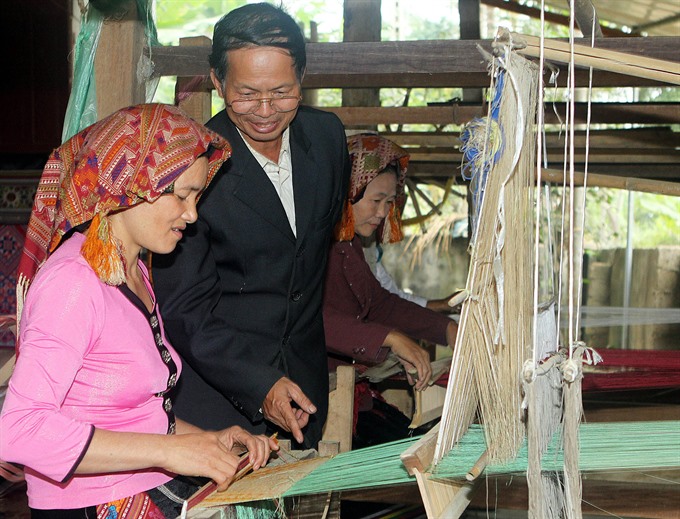 Society
Society

Thousands of billion of đồng invested in vocational training for residents of northern mountainous provinces have produced little effectiveness, according to the General Department of Vocational Training.
 |
| An ethnic-minority woman learns how to weave brocade fabric in central Nghệ An Province’s Quỳ Châu District. — VNA/VNS Photo Hữu Việt |
HÀ NỘI — Thousands of billion of đồng invested in vocational training for residents of northern mountainous provinces have produced little effectiveness, according to the General Department of Vocational Training.
It is estimated that about VNĐ 1.5 trillion (US$67.1 million) in State budget funds and about $1.3 million in development assistance have been used to help rural labourers raise their income and improve their living standards through vocational training. The department estimates that about 140,000 people in the northern provinces participate in vocational training courses each year, reported Tin tức (News) newspaper.
However, only a small part of the graduates were recruited as short-term labourers in local firms, the department said.
According to experts, many vocational training courses do not take into account the demands of the labour market and that is one of the reasons for their ineffectiveness.
A representative of the People’s Committee in Phú Thọ Province’s Lai Đồng Commune said nearly 200 villagers attended vocational training courses in the last five years. After the courses, most of them continued farming.
Hà Thị Lan Hương of Phát 1 Village in the commune said she and 100 other villagers learned how to embroider during three months.
“At first days, all of us hoped we could earn a better living by embriodering,” she said. “But things do not always turn out the way we plan.”
They failed to find buyers for products they made and all quit and went back to farming, she said.
Experts also said a shortage of in-depth training due to short-term courses added to the problem.
Bùi Văn Nam of Hòa Bình Province’s Tân Lạc District said training courses often provide initial skills for a career. But he had to study and practice more before he could make a living in the skill he learned - mechanics.
Vũ Văn Thịnh of the Quảng Ninh Province’s Coal and Mineral Vocational Training School said many vocational training centres failed to provide clear orientation on how to choose a suitable career.
Many people therefore signed up for courses unsuitable for their locality, he said.
Solutions outlined
Trương Xuân Cừ, deputy head of the Northwest Region Steering Committee, said people in the region now pay more attention to vocational training given that university graduates are failing to get jobs.
Therefore, building a high-quality vocational training school to meet the demand of both learners and the market was necessary, he said.
Deputy Minister of Labour, Invalid and Social Affairs, Huỳnh Văn Tý, said to attract students vocational training schools should reach a commitment by local firms to hire graduates. In the future, he added, training schools or centres would only be allowed to open if they could ensure jobs for students.
In a related move, the General Department of Vocational Training submitted a request to build two high-quality vocational training schools. — VNS




